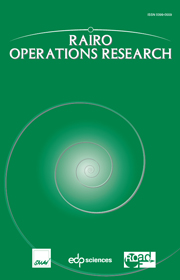Crossref Citations
This article has been cited by the following publications. This list is generated based on data provided by
Crossref.
Hansen, Pierre
and
Meyer, Christophe
2009.
Improved compact linearizations for the unconstrained quadratic 0–1 minimization problem.
Discrete Applied Mathematics,
Vol. 157,
Issue. 6,
p.
1267.
Ahlatçıoğlu, Aykut
Bussieck, Michael
Esen, Mustafa
Guignard, Monique
Jagla, Jan-Hendrick
and
Meeraus, Alexander
2012.
Combining QCR and CHR for convex quadratic pure 0–1 programming problems with linear constraints.
Annals of Operations Research,
Vol. 199,
Issue. 1,
p.
33.
Billionnet, Alain
2013.
Mathematical optimization ideas for biodiversity conservation.
European Journal of Operational Research,
Vol. 231,
Issue. 3,
p.
514.
Gorge, Agnès
Lisser, Abdel
and
Zorgati, Riadh
2015.
Generating cutting planes for the semidefinite relaxation of quadratic programs.
Computers & Operations Research,
Vol. 55,
Issue. ,
p.
65.
Wu, Baiyi
Sun, Xiaoling
Li, Duan
and
Zheng, Xiaojin
2017.
Quadratic Convex Reformulations for Semicontinuous Quadratic Programming.
SIAM Journal on Optimization,
Vol. 27,
Issue. 3,
p.
1531.
Wu, Baiyi
and
Jiang, Rujun
2017.
Optimization and Control for Systems in the Big-Data Era.
Vol. 252,
Issue. ,
p.
43.
Wu, Baiyi
Li, Duan
and
Jiang, Rujun
2019.
Quadratic convex reformulation for quadratic programming with linear on–off constraints.
European Journal of Operational Research,
Vol. 274,
Issue. 3,
p.
824.
Azhar, Shanila
Chang, Shan
Liu, Ye
Tao, Yuting
Liu, Guohua
and
Sun, Donghong
2020.
Quality, Reliability, Security and Robustness in Heterogeneous Systems.
Vol. 300,
Issue. ,
p.
38.
Jarachanthan, Jananie
Chen, Li
Xu, Fei
and
Li, Bo
2021.
AMPS-Inf: Automatic Model Partitioning for Serverless Inference with Cost Efficiency.
p.
1.
Azhar, Shanila
Chang, Shan
Liu, Ye
Tao, Yuting
and
Liu, Guohua
2022.
Privacy-preserving and Utility-aware Participant Selection for Mobile Crowd Sensing.
Mobile Networks and Applications,
Vol. 27,
Issue. 1,
p.
290.
Ahmadi-Javid, Amir
and
Hoseinpour, Pooya
2022.
Convexification of Queueing Formulas by Mixed-Integer Second-Order Cone Programming: An Application to a Discrete Location Problem with Congestion.
INFORMS Journal on Computing,
Vol. 34,
Issue. 5,
p.
2621.
Punnen, Abraham P.
and
Sotirov, Renata
2022.
The Quadratic Unconstrained Binary Optimization Problem.
p.
139.
Ordozgoiti, Bruno
Mahadevan, Ananth
Matakos, Antonis
and
Gionis, Aristides
2022.
Provable randomized rounding for minimum-similarity diversification.
Data Mining and Knowledge Discovery,
Vol. 36,
Issue. 2,
p.
709.
Chen, Lin
Ha, Vu Nguyen
Lagunas, Eva
Wu, Linlong
Chatzinotas, Symeon
and
Ottersten, Björn
2023.
The Next Generation of Beam Hopping Satellite Systems: Dynamic Beam Illumination With Selective Precoding.
IEEE Transactions on Wireless Communications,
Vol. 22,
Issue. 4,
p.
2666.
Jarachanthan, Jananie
Chen, Li
and
Xu, Fei
2023.
ACTS: Autonomous Cost-Efficient Task Orchestration for Serverless Analytics.
p.
1.




